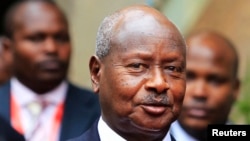A Ugandan government spokesman has accused the United States of "blackmail" after President Barack Obama's administration cut funding to Uganda and canceled a regional military exercise in response to a new law criminalizing homosexuality.
Ofwono Opondo told VOA that as a sovereign country, Uganda would continue to make decisions in its best interest.
Opondo said his government rejects the U.S. decision as blackmail.
"We think it is simply a blackmail. We have said it before, homosexuality is not a fundamental human right. In our own constitution, it is not guaranteed as a fundamental right," said Opondo.
On Thursday, the U.S. announced it had canceled plans for a U.S.-sponsored military exercise that was going to be held in Uganda. The Obama administration also cut funding to the country and barred Ugandans believed to be involved in human rights abuses from entering the United States.
U.S. National Security Council spokeswoman Caitlin Hayden said Uganda's legislation ran "counter to universal human rights."
In February, President Yoweri Museveni signed the measure that criminalizes homosexuality with punishments of up to life in prison. The legislation drew widespread international condemnation.
Opondo was asked if he believed U.S. opposition would jeopardize President Museveni's chances of being invited to a White House summit with African leaders in August.
"The United States government should use that summit to engage with the president of Uganda through diplomatic channels rather than blackmail. Preventing him from attending the summit, that would not in any way cancel the validity of the law passed by Uganda. So, we think that continuous engagement is much better than blackmail,” said Opondo.
Opondo also said the U.S. did not formally notify Uganda when it announced the new penalties on Thursday. He said the Ugandan government found out about the U.S. decision through media reports.
Homosexuality is a crime in 38 African countries.
Ofwono Opondo told VOA that as a sovereign country, Uganda would continue to make decisions in its best interest.
Opondo said his government rejects the U.S. decision as blackmail.
"We think it is simply a blackmail. We have said it before, homosexuality is not a fundamental human right. In our own constitution, it is not guaranteed as a fundamental right," said Opondo.
On Thursday, the U.S. announced it had canceled plans for a U.S.-sponsored military exercise that was going to be held in Uganda. The Obama administration also cut funding to the country and barred Ugandans believed to be involved in human rights abuses from entering the United States.
U.S. National Security Council spokeswoman Caitlin Hayden said Uganda's legislation ran "counter to universal human rights."
In February, President Yoweri Museveni signed the measure that criminalizes homosexuality with punishments of up to life in prison. The legislation drew widespread international condemnation.
Opondo was asked if he believed U.S. opposition would jeopardize President Museveni's chances of being invited to a White House summit with African leaders in August.
"The United States government should use that summit to engage with the president of Uganda through diplomatic channels rather than blackmail. Preventing him from attending the summit, that would not in any way cancel the validity of the law passed by Uganda. So, we think that continuous engagement is much better than blackmail,” said Opondo.
Opondo also said the U.S. did not formally notify Uganda when it announced the new penalties on Thursday. He said the Ugandan government found out about the U.S. decision through media reports.
Homosexuality is a crime in 38 African countries.
